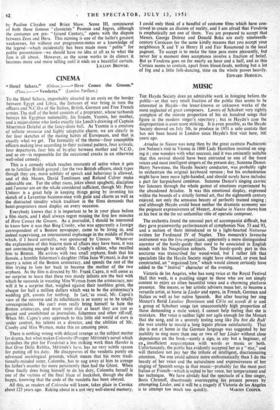MUSIC • THE Haydn Society does an admirable work in
bringing before, the public—or that very small fraction of the public that seems to be interested in Haydn—the lesser-known or unknown works of the most neglected of great composers. Lovers of Schubert very rightly complain of the- minute proportion of his six hundred songs that figure in the modern singer's repertory ; but in Haydn's case the disProportion is even more striking. It is even possible, as the Haydn Society showed on July 5th, to produce in 1951 a solo cantata that has not been heard in London since Haydn's first visit here, 160 years ago.
Ariadne in Naxos was sung then by the great castrato Pachierotti (on Nelson's visit to Vienna in 1800 Lady Hamilton insisted on sing- ing it ; one wonders with what success), and it was eminently suitable that. this revival should have- been entrusted to one of the finest voices and most intelligent singers of the present day, Suzanne Dance). Harry Newstone, the Haydn Society conductor, was probably right to orchestrate the original keyboard version • but his orchestration might have been more light-handed, and should surely have included a part for harpsichord continuo. Suzanne Danco's singing carried her listeners through the whole gamut of emotions experienced by the abandoned Ariadne. It was this emotional display, expressed within the bounds of a strictly formal art, that the eighteenth century enjoyed, not only the sensuous beauty of perfectly trained singing ; and although Haydn could boast neither the dramatic economy nor the poignant expressiveness of Mozart, Ariadne in Naxos shows him at his best in the (to us) unfamiliar role of operatic composer.
The orchestra found the unusual part of accompanist difficult, but they gave praiseworthy performances of symphonies Nos. 53 and 93, and a section of them introduced us to a light-hearted Notturno written for Ferdinand IV of Naples. This monarch's favourite instrument was the lyra organizzata, apparently a more distinguished ancestor of the hurdy-gurdy -that used to be associated in English minds with his Neapolitan subjects. The hurdy-gurdy part in this nocturne was. transcribed for wood-wind, but I rather felt that specialists like the Haydn Society might have obtained, or even had constructed, an " organised lyre," which would almost certainly have added to the " festival " character of the evening.
Victoria de los Angeles, who has sung twice at the Royal Festival Hall this week, is a puzzling singer to those who are not simply content to enjoy an often beautiful voice and a charming platform presence. She means, or her artistic advisers mean her, to become a versatile artist, at home in Lieder and opera, in French, German and Italian as well as her native Spanish. But after hearing her sing Mozart's florid Laudate Dominum and Ch'io mi scordi di to and a group of Schubert songs (an unaccountably high proportion of those demanding a male voice), I cannot help feeling that she is mistaken. Her voice is neither light nor agile enough for the Mozart that she sang, and in a severely testing song like Du hist die Ruh' she was unable to mould a long legato phrase satisfactorily. That she is not at home in the German language was suggested by her inability to sing more than one or two of her Lieder without close dependence on the book—surely a sign, in any but a beginner, of an insufficient acquaintance with words or music or both. Unfortunately, the public has evidently accepted her as a r' star," and will therefore not pay her the tribute of intelligent, discriminating attention. No one could admire more enthusiastically than I do the beauty of her voice and the naturalness and expressiveness of her singing of Spanish songs in that music—probably for the most part Italian or French—which is suited to her voice, her temperament and her technique. We have already had the spectacle of a fine singer, Boris Christoff, disastrously overstepping his present powers by attempting Lieder, and it will be a tragedy if Victoria de los Angeles






































 Previous page
Previous page